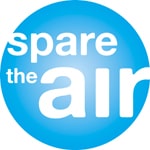 Summer Spare the Air Season is upon us! Get Spare the Air Alerts & other air quality information sent directly to your phone with the iSmog App.
Summer Spare the Air Season is upon us! Get Spare the Air Alerts & other air quality information sent directly to your phone with the iSmog App.
During the summer months, ozone levels in the Bay Area can exceed Federal health-based standards. The Air District’s Spare the Air program issues alerts to let residents know when air quality is expected to be unhealthy. Beyond encouraging people to drive less on high-pollution days, Spare the Air alerts provide critical information for people who suffer from asthma or other respiratory problems.
With 511CC’s free iSmog app for iPhone, you’ll receive Spare the Air alerts and be able to display air quality information for the Bay Area as an easy-to-understand map. Users with allergies or other environmental sensitivities are able to customize air quality notifications based on their level of sensitivity & geographic area.
Download the iSmog app for iPhone, or visit the SpareTheAir.org for more information on how to stay updated on Bay Area air quality.
Tag: Air District
Winter Spare the Air Season Has Begun (2015)
During the winter season, wood smoke is the largest source of harmful particulate pollution in the Bay Area. On a typical winter night, wood burning produces about one-third of the pollution in the air. From November 1 through the end of February, the Air District helps manage airborne pollution by calling Winter Spare the Air Alerts when the air quality is expected to be unhealthy.

Each day by early afternoon, the Air District will issue an air quality forecast for the next day. If a Winter Spare the Air Alert is called, it will be in effect the entire next day, for a full 24 hours. When an Alert is in effect, it is illegal to burn wood, manufactured fire logs, pellets, or any other solid fuels in your fireplace, woodstove or outdoor fire pit.
Residents can find information about the health effects of wood smoke, as well as detailed information about the Wood Burning Rule and how to comply with it on SpareTheAir.org’s website. You can also file a wood smoke complaint online.
2014 Winter Spare the Air Season Has Begun

During the winter season, wood smoke is the largest source of harmful particulate pollution in the Bay Area. On a typical winter night, wood burning produces about one-third of the pollution in the air. From November 1 through the end of February, the Air District helps manage airborne pollution by calling Winter Spare the Air Alerts when the air quality is expected to be unhealthy.
Each day by early afternoon, the Air District will issue an air quality forecast for the next day. The alert will be in effect the entire next day, for a full 24 hours. When a Winter Spare the Air Alert is in effect, it is illegal to burn wood, manufactured fire logs, pellets, or any other solid fuels in your fireplace, woodstove or outdoor fire pit.
Residents can find information about the health effects of wood smoke, as well as detailed information about the Wood Burning Rule and how to comply with it on SpareTheAir.org’s website. You can also file a wood smoke complaint online.
Bay Area Climate Protection Strategy Workshop (2014)
The Bay Area Air Quality Management District invites you to a workshop on the Clean Air Plan and to initiate development of a Bay Area Climate Protection Strategy.
When: February 28, 2014, 9:30 am – 11:30 am
Where: Air District Office, 939 Ellis Street, San Francisco, 7th Floor
The purpose of the workshop is:
- To kick off the planning process for updating the Clean Air Plan
- To initiate the planning process to develop a Climate Protection Strategy for the Bay Area, which will be included as new element of the Clean Air Plan
- To report progress on implementing the control measures in the 2010 Clean Air Plan
- To solicit ideas and strategies to further reduce ozone precursors (nitrogen oxides, volatile organic compounds), particulate matter, toxic air contaminants, and greenhouse gases
- To seek input on innovative strategies to reduce greenhouse gases, mechanisms for tracking progress in reducing GHGs, and how the Air District may further support actions to reduce GHGs
- To describe future steps and the overall schedule in developing the Clean Air Plan update and Bay Area Climate Protection Strategy
Contact: Christy Riviere at 415-749-4925 or criviere@baaqmd.gov
See the flyer for more information or visit: http://www.baaqmd.gov/Divisions/Planning-and-Research/Plans/Clean-Air-Plan-Update.aspx
The workshop will be webcasted LIVE on the above listed at http://www.baaqmd.gov/Divisions/Planning-and-Research/Plans/Clean-Air-Plan-Update.aspx. Take transit! Civic Center BART station and MUNI lines 47, 49, 38 are nearby. Bike racks located onsite. More transit info at www.511.org.
